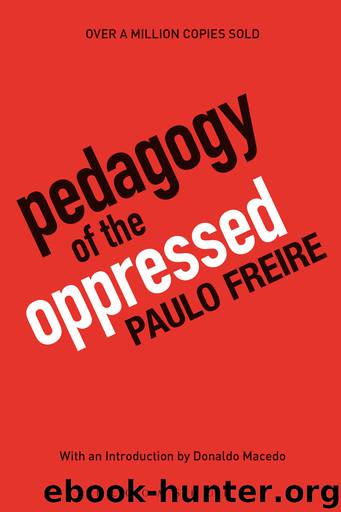Pedagogy of the Oppressed by Freire Paulo; Bergman Ramos Myra;

Author:Freire, Paulo; Bergman Ramos, Myra;
Language: eng
Format: epub
Publisher: Bloomsbury Publishing
Published: 2014-03-05T16:00:00+00:00
* * *
1.
Sacrifice of action = verbalism
Sacrifice of reflection = activism
2. Some of these reflections emerged as a result of conversations with Professor Ernani Maria Fiori.
3. I obviously do not refer to the silence of profound meditation, in which men only apparently leave the world, withdrawing from it in order to consider it in its totality, and thus remaining with it. But this type of retreat is only authentic when the meditator is “bathed” in reality; not when the retreat signifies contempt for the world and flight from it, in a type of “historical schizophrenia.”
4. I am more and more convinced that true revolutionaries must perceive the revolution, because of its creative and liberating nature, as an act of love. For me, the revolution, which is not possible without a theory of revolution—and therefore science—is not irreconcilable with love. On the contrary: the revolution is made by people to achieve their humanization. What, indeed, is the deeper motive which moves individuals to become revolutionaries, but the dehumanization of people? The distortion imposed on the word “love” by the capitalist world cannot prevent the revolution from being essentially loving in character, nor can it prevent the revolutionaries from affirming their love of life. Guevara (while admitting the “risk of seeming ridiculous”) was not afraid to affirm it: “Let me say, with the risk of appearing ridiculous, that the true revolutionary is guided by strong feelings of love. It is impossible to think of an authentic revolutionary without this quality.” Venceremos—The Speeches and Writings of Che Guevara, edited by John Gerassi (New York, 1969), p. 398.
5. From the letter of a friend.
6. Pierre Furter, Educação e Vida (Rio, 1966), pp. 26-27.
7. In a long conversation with Malraux, Mao-Tse-Tung declared, “You know I’ve proclaimed for a long time: we must teach the masses clearly what we have received from them confusedly.” Andrê Malraux, Anti-Memoirs (New York, 1968), pp. 361- 362. This affirmation contains an entire dialogical theory of how to construct the program content of education, which cannot be elaborated according to what the educator thinks best for the students.
8. Furter, op. cit., p. 165.
9. The latter, usually submerged in a colonial context, are almost umbilically linked to the world of nature, in relation to which they feel themselves to be component parts rather than shapers.
10. “Our cultural workers must serve the people with great enthusiasm and devotion, and they must link themselves with the masses, not divorce themselves from the masses. In order to do so, they must act in accordance with the needs and wishes of the masses. All work done for the masses must start from their needs and not from the desire of any individual, however well-intentioned. It often happens that objectively the masses need a certain change, but subjectively they are not yet conscious of the need, not yet willing or determined to make the change. In such cases, we should wait patiently. We should not make the change until, through our work, most of the masses have become conscious of the need and are willing and determined to carry it out.
Download
This site does not store any files on its server. We only index and link to content provided by other sites. Please contact the content providers to delete copyright contents if any and email us, we'll remove relevant links or contents immediately.
The Secret History by Donna Tartt(18157)
The Social Justice Warrior Handbook by Lisa De Pasquale(11951)
Thirteen Reasons Why by Jay Asher(8451)
This Is How You Lose Her by Junot Diaz(6434)
Weapons of Math Destruction by Cathy O'Neil(5828)
Zero to One by Peter Thiel(5488)
Beartown by Fredrik Backman(5350)
The Myth of the Strong Leader by Archie Brown(5237)
The Fire Next Time by James Baldwin(5016)
How Democracies Die by Steven Levitsky & Daniel Ziblatt(4952)
Promise Me, Dad by Joe Biden(4908)
Stone's Rules by Roger Stone(4854)
100 Deadly Skills by Clint Emerson(4688)
A Higher Loyalty: Truth, Lies, and Leadership by James Comey(4550)
Rise and Kill First by Ronen Bergman(4543)
Secrecy World by Jake Bernstein(4388)
The David Icke Guide to the Global Conspiracy (and how to end it) by David Icke(4377)
The Farm by Tom Rob Smith(4322)
The Doomsday Machine by Daniel Ellsberg(4243)
